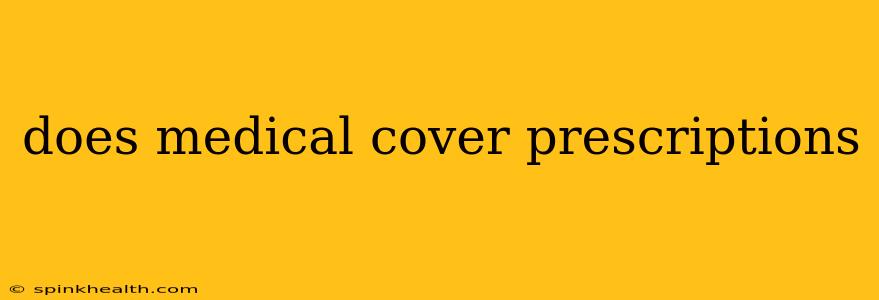Does Medical Cover Prescriptions? Navigating the Maze of Prescription Drug Coverage
The question of whether medical insurance covers prescriptions is a common one, and the answer, unfortunately, isn't a simple "yes" or "no." It's a journey through a complex landscape of insurance plans, formularies, and individual circumstances. Imagine this: You're feeling under the weather, your doctor diagnoses you, and writes you a prescription. The final step – picking up your medication – shouldn't be a financial hurdle, right? Let's unpack this together.
What is a Formulary, and Why Does it Matter?
Many health insurance plans, whether they're through your employer, a marketplace, or Medicare/Medicaid, use something called a formulary. Think of it as a drug list, a curated selection of medications that the insurance company has pre-approved for coverage. This formulary dictates which drugs are covered, and often at what cost. Your specific prescription might be on the formulary, but perhaps at a higher tier (meaning higher cost-sharing for you). Or, it might not be on the formulary at all, requiring a pre-authorization or alternative options.
What Factors Influence Prescription Drug Coverage?
Several factors influence whether your prescription will be covered and how much you'll pay out-of-pocket. Let's explore them:
-
Type of Insurance Plan: A high-deductible health plan (HDHP) typically has lower monthly premiums but higher out-of-pocket expenses before coverage kicks in. A Preferred Provider Organization (PPO) offers more flexibility in choosing doctors but may be more expensive. Each has its own rules regarding prescription drug coverage. Understanding your plan's specifics is crucial.
-
Tiering System: Most formularies organize drugs into tiers, reflecting their cost and therapeutic value. Tier 1 usually consists of generic drugs, typically the least expensive. Tier 2 might include preferred brand-name drugs, while Tier 3 or higher contains non-preferred or specialty drugs, often with the highest co-pays or cost-sharing.
-
Pre-authorization: Some medications, especially those considered high-cost or with potential for misuse, may require pre-authorization from your insurance company before they'll cover it. This usually involves your doctor submitting a request explaining the medical necessity of the medication.
-
Generic vs. Brand-Name Drugs: Generic drugs are typically much cheaper than brand-name drugs, and many plans heavily incentivize the use of generics through lower co-pays.
What if My Prescription Isn't Covered?
If your prescription isn't covered by your insurance, or if the cost is prohibitive, don't panic! Several options exist:
-
Talk to your doctor: Discuss alternative medications on your plan's formulary. There might be a clinically suitable equivalent that's more affordable.
-
Appeal the decision: If you believe your medication is medically necessary and the denial is unjustified, you can appeal the insurance company's decision.
-
Patient assistance programs: Many pharmaceutical companies offer patient assistance programs to help individuals afford their medications. These programs often provide free or discounted medications based on financial need.
-
Negotiate with your pharmacy: Some pharmacies offer payment plans or discounts.
Does Medicare Cover Prescriptions?
Medicare Part D specifically covers prescription drugs. However, like other insurance plans, it has its own formulary, and you'll need to choose a Part D plan to get this coverage. Understanding the nuances of Medicare Part D and choosing the right plan is critical for maximizing your prescription drug benefits.
Does Medicaid Cover Prescriptions?
Medicaid, a joint federal and state program, does cover prescription drugs. However, coverage varies from state to state. Some states have extensive formularies, while others may be more restrictive. Contact your state's Medicaid office to learn about specific coverage details in your area.
Navigating prescription drug coverage can be overwhelming. The key is to understand your plan's details, including its formulary and cost-sharing responsibilities. Don't hesitate to contact your insurance provider or pharmacist if you have any questions or need assistance. Remember, your health shouldn't suffer due to the cost of medication. There are resources available to help you get the treatment you need.

